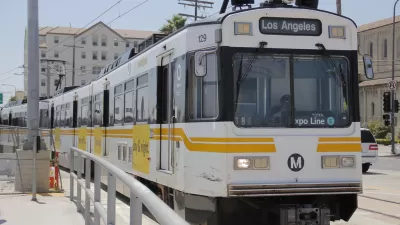Gas taxes, parking charges, toll roads - these are the ingredients to making transit successful, according to experts who state that it's not enough to offer good transit - driving must become more expensive. Add to that high density land use.
David Lazarus, business reporter for the LA Times, took a 2-week trip to Japan and took every conceivable form of public transit, from high speed rail to buses, and then questioned transit experts as to why transit doesn't work well in this country.
"Brian Taylor, director of UCLA's Institute of Transportation Studies, said the hardest part isn't constructing the infrastructure for a world-class public transit system. It's creating the necessary incentives to get Americans out of their cars.
"We now keep the cost of driving as cheap as we possibly can," Taylor said. "As long as we do that, we won't be able to make public transportation work."
"David Boyce, an adjunct professor of civil and environmental engineering at Northwestern University, said another key piece of the puzzle is land use. Americans prefer low-density communities and large lots for their homes."
Lazarus came away less than hopeful that making driving less attractive and land use denser were likely to occur, meaning that the billions of dollars spent on improving public transit was not likely to attract that many new riders.
"So don't hold your breath for a public transportation system that rivals what our friends abroad enjoy. It's not going to happen -- at least not until a majority of us agree that we're prepared to accept the trade-offs necessary to bring about such a wholesale change in how we live and travel."
Thanks to Roy Nakadegawa
FULL STORY: U.S. public transit improvements will be a tough sell

Maui's Vacation Rental Debate Turns Ugly
Verbal attacks, misinformation campaigns and fistfights plague a high-stakes debate to convert thousands of vacation rentals into long-term housing.

Planetizen Federal Action Tracker
A weekly monitor of how Trump’s orders and actions are impacting planners and planning in America.

In Urban Planning, AI Prompting Could be the New Design Thinking
Creativity has long been key to great urban design. What if we see AI as our new creative partner?

Florida Seniors Face Rising Homelessness Risk
High housing costs are pushing more seniors, many of them on a fixed income, into homelessness.

Massachusetts Budget Helps Close MBTA Budget Gap
The budget signed by Gov. Maura Healey includes $470 million in MBTA funding for the next fiscal year.

Milwaukee Launches Vision Zero Plan
Seven years after the city signed its Complete Streets Policy, the city is doubling down on its efforts to eliminate traffic deaths.
Urban Design for Planners 1: Software Tools
This six-course series explores essential urban design concepts using open source software and equips planners with the tools they need to participate fully in the urban design process.
Planning for Universal Design
Learn the tools for implementing Universal Design in planning regulations.
Gallatin County Department of Planning & Community Development
Heyer Gruel & Associates PA
JM Goldson LLC
City of Camden Redevelopment Agency
City of Astoria
Transportation Research & Education Center (TREC) at Portland State University
Jefferson Parish Government
Camden Redevelopment Agency
City of Claremont



























